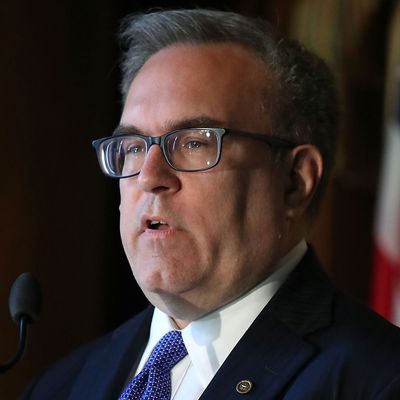
The Trump administration would like you to believe that its opposition to environmental regulations is motivated by a desire to maximize economic growth. Many of Trump’s critics insist that this is false — and that his White House is less concerned with aiding “the economy” than with protecting the profits of corporate titans.
But during Scott Pruitt’s tenure, the Environmental Protection Agency often behaved as though increasing pollution was an end in itself; and/or as though the agency’s sole mandate was to maximize America’s airborne soot — and “liberal tears” — per capita.
Take Pruitt’s final action as EPA chief. Right before making his exit, Pruitt sent a “no action assurance” letter to manufacturers of glider trucks — a type of truck that emits 20 to 40 times as much nitrogen oxide and soot as similar vehicles with newer engines. There were corporate interests on both sides of this issue. Manufacturers of cleaner truck engines stood to make big money off the Obama-era rule. And major trucking industry lobbies joined those firms in supporting the regulation. On the other side were just a handful of glider-truck makers, the most prominent being Fitzgerald Truck Sales of Tennessee (not exactly an industrial powerhouse).
If Pruitt wanted to let private economic power dictate American environmental policy, he would have left the rule in place. Instead, he put his solemn duty to eviscerate the first black president’s legacy — and to deny the legitimacy of federal air quality regulations, as such — above the special interests’ pleading.
And the former EPA director took a similar stand on Barack Obama’s fuel economy rules. A pillar of Obama’s environmental legacy, said rules would require automakers to nearly double the fuel efficiency of their cars by 2025. If fully implemented, the measure would represent the most significant action the U.S. government has taken to combat climate change.
In this case, the regulation in question does genuinely threaten the profit margins of American energy producers. But many of the firms directly subject to the fuel efficiency rules — i.e., automakers — have implored the administration to keep the regulations in place. Many car manufacturers have already made production plans that presume the standards will go forward. Others prefer a stringent rule to the regulatory uncertainty that a rollback would surely produce — after all, California has a waiver under the 1970 Clean Air Act that allows it to set its own fuel standards. And that blue state has indicated that it intends to stick to Obama’s rules, no matter what federal bureaucrats decide to do.
Nevertheless, Pruitt persisted. And with his guidance, the EPA developed a plan to loosen Obama’s efficiency standards — and challenge California’s right to set its own.
But Andrew Wheeler’s hatred of clean air is not as pure as Pruitt’s. And the new acting EPA chief has proven less interested in implementing legally dubious deregulatory measures — that are opposed by many powerful corporations — just for the sake of poisoning the atmosphere and owning the libs.
So, on Thursday, Wheeler rescinded Pruitt’s “no action assurance” letter to the glider-truck industry. In a memo, Wheeler explained that the EPA is only supposed to suspend enforcement in rare circumstances, and that he had “concluded that the application of the current regulations to the glider industry does not represent the kind of extremely unusual circumstances that support the EPA’s use of enforcement discretion.”
A little over a week earlier, environmental groups won a stay against the policy in the U.S. Court of Appeals for the D.C. Circuit. And the dubious legal rationale for Pruitt’s policy likely figured into Wheeler’s calculus.
“This had all the hallmarks of a major loss,” Justin A. Savage, a laweyer who specializes in environmental issues, told the Washington Post Thursday. “This was so broadly cast this would have potentially circumscribed the agency’s ability to issues these kinds of letters in the future.”
At least six of Pruitt’s deregulatory measures have already been struck down by federal courts. And as Savage suggests, such recklessly aggressive attacks on the environment can undermine the right’s long-term deregulatory goals. In the glider case, Pruitt’s entire argument rested on one glider-industry-funded study from Tennessee Tech University — which the university’s president subsequently disavowed as methodologically unsound.
Meanwhile, Wheeler is reportedly telling other Trump appointees that the administration’s long-planned attack on Obama’s fuel efficiency standards is also legally reckless. As the New York Times reports:
On one side is the Environmental Protection Agency’s acting chief, Andrew K. Wheeler, who has tried to put the brakes on the plan, fearing that its legal and technical arguments are weak and will set up the Trump administration for an embarrassing courtroom loss. Mr. Wheeler inherited the proposal from his predecessor, Scott Pruitt, who resigned on July 5 under a cloud of ethics investigations.
On the other side are top officials at the Transportation Department, Jeffrey A. Rosen and Heidi King, two of the proposal’s chief authors.
Mr. Rosen, a former George W. Bush administration official known for his zeal to undo federal regulations, is pushing the controversial proposal on the expectation that by the time any challenge makes it to the Supreme Court, the court’s makeup will be more friendly to a conservative, anti-regulatory policy, according to individuals familiar with his thinking.
So: Wheeler believes that the proposal is illegal; automakers say it’s bad for business; and decades of climate science (and a month of wildfires spanning from California to the Arctic) say that it’s bad for the long-term survival of human civilization.
But conservatives are confident that Brett Kavanaugh can engineer a rationale for the measure’s legality — and thus, Trump plans to announce the policy next week.






























